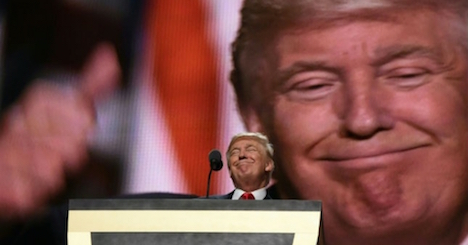Donald Trump is a buffoon, a narcissist and misogynist who has offended large segments of the American population with racist comments. He has so little impulse control that he erupted with a pathetic defense of the size of his penis in the middle of a presidential debate, and retweeted an unflattering picture of former rival Sen. Ted Cruz's (R-Texas) wife next to his own wife. At that point many doubted whether this "man baby" — as Jon Stewart called him — with an eighth-grade mentality could get much further without self-destructing. But he did. With all this foul baggage and unpopular political positions on many issues, you have to wonder why so many liberals would insist on trying to discredit Trump, the GOP nominee, for the few things he says that are arguably true or sensible. At least presumptive Democratic nominee Hillary Clinton was smart enough to try and take the "trade" issue away from him — thanks largely to Sen. Bernie Sanders's (Vt.) Democratic primary campaign — by changing her position and opposing the Trans-Pacific Partnership (TPP) (although her delegates fought to keep this opposition out of the Democratic platform). Since last week, Trump has come under heavy fire his response to a question as to whether he would "come to their immediate military aid" if NATO members including Latvia, Lithuania or Estonia, were attacked by Russia. He said yes, but only "if they fulfill their obligations to us." He asserted that he wants Europeans to pay for their own defense. Imagine that! I'm sure that the white working-class voters who will, as in most of the presidential elections of the past half-century, make up the swing voters this year will recoil in horror at this idea. The European Union has a gross domestic product that is bigger than that of the United States (on a purchasing power parity basis). Most of these countries also provide their citizens with benefits that Americans don't have, like real universal healthcare, subsidized child care, paid vacations averaging more than five weeks, and free or low-cost college tuition. Part of the reason that they get so much more for their tax dollars than we do is that they are not spending nearly as much on trying to police the world — although their security problems have increased considerably since Washington (with a lot of help from EU countries) turned the Middle East and North Africa into a hellish mess that exports more terrorism and refugees than ever before. In any case, it's a tough sell for working and middle-class voters here that their tax dollars should pay for Europe's defense. Or that we should risk a nuclear war with Russia if it were to invade Estonia — which is the principle for which Trump has been so reviled for lately, for not defending, by the (liberal/conservative) foreign policy establishment. Of course, if your opponent says something friendly or diplomatic about a demonized foreign leader, it is generally an easy score in U.S. politics to tar them with that. The media can be counted on to help make this into a capital offense. But if we look at the substance of Trump's proposal to reach a deal with Russian President Vladimir Putin, it's tough to see what's wrong with the concept. Do we really want another Cold War and an indefinite arms race with Russia? There is a whole other side to this story that Trump probably doesn't even know, and that the media aren't going to talk about. Neoconservative U.S. officials like Victoria Nuland, assistant secretary of State for European and Eurasian affairs, played a major role in fomenting the civil war in Ukraine in the first place. They want an arms buildup surrounding Russia that would make any people, not least the Russians who have suffered devastating invasions from the east, nervous. Nuland is a Hillary Clinton protege who is likely to have an even higher position than at present in her administration. For these and related reasons, a number of the most violence-prone neocons — the kind who loved the Iraq War and in fact never met a war that they didn't like — have endorsed Clinton over Trump. On the other side, more serious scholars such as Stephen Cohen, John Mearsheimer and even the former war criminal Henry Kissinger have criticized Washington's confrontational and destructive role, and the folly of pursuing a new Cold War. Do liberals really want to trash Trump for taking positions that are less aggressively militaristic than the nation's most warmongering neoconservatives? If there's any way to lose an election to the most disliked candidate ever to run for president of the United States, attacking him for the things he says that make sense is a good start. Mark Weisbrot is Co-Director of the Center for Economic and Policy Research (CEPR), in Washington, DC. He is also president of Just Foreign Policy. Source URL |
